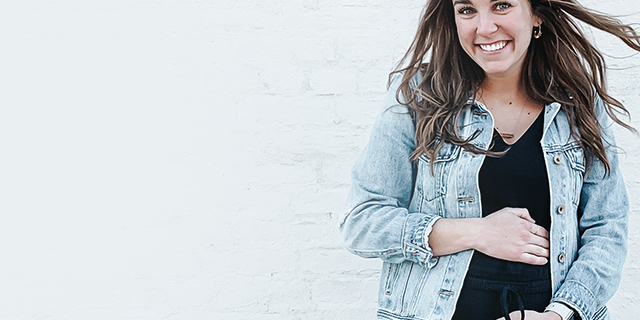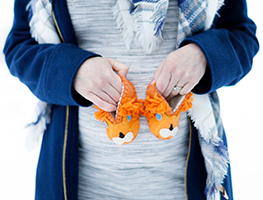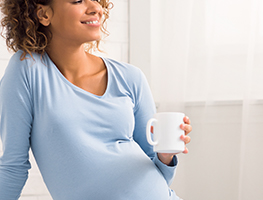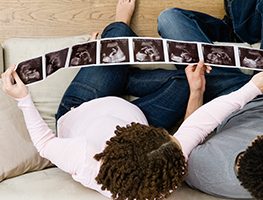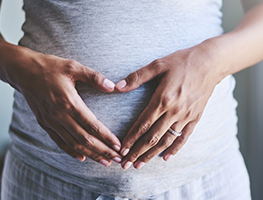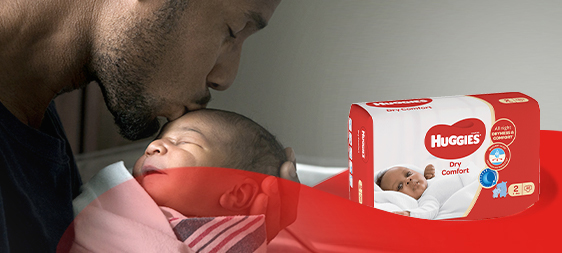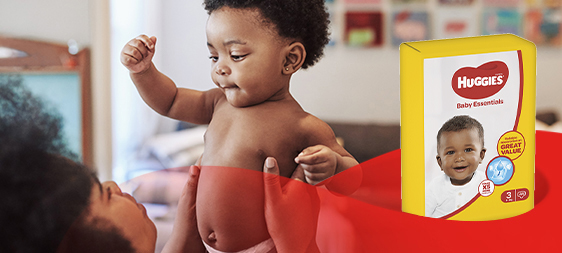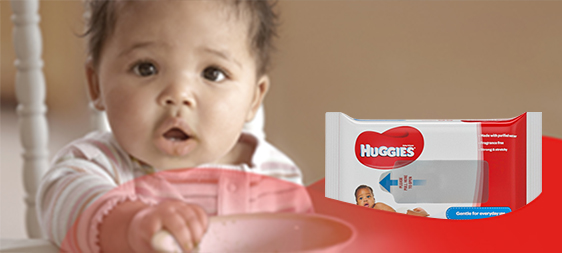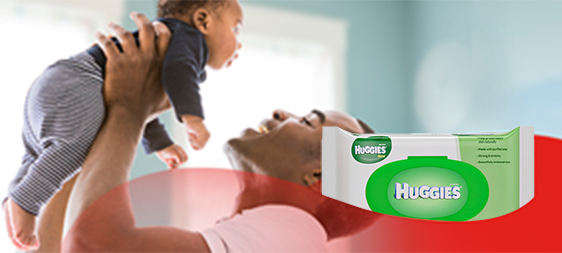Week 25 pregnant
Air sacs are forming in your baby’s lungs, in preparation for its first breaths. There’s lots of lung development happening this week and although you are still doing all the breathing for your baby at the moment, it will need to be ready to breathe on its own from the moment of birth.
You are almost 6 months into your pregnancy. Your belly is rounded and you are looking more pregnant with every week that passes. No doubt you’ve started to plan for the baby and are thinking about what you’ll need. If you’ve had a baby before this will all come relatively easily to you, but if this is your first, it can all seem a little overwhelming. There are so many choice and options available to expectant parents. Combined with a foggy pregnancy brain, it can all seem totally confusing.
Where did I put my shopping list?
Babies themselves don’t need much to keep them happy. A full belly, a safe place to sleep, loving care and a clean, dry nappy are some of the basics. Try not to go overboard when you start thinking about organising the nursery. Do your research and try to imagine what you’ll need long-term, rather than buying expensive items that look gorgeous but that you’ll only use for a few months.
Ask other parents what they’d recommend and what they couldn’t do without. Think about adding some extra baby toiletries, packs of nappies and baby wipes into your shopping trolley each week; your costs will be absorbed more gradually and it won’t be such a financial jolt all at once.
Oh, look at that!
Have a shopping excursion to check out baby clothing sizes. Become familiar with how sizes correlate with age. It is incredibly tempting to start buying at least a few baby clothes around now. You may find them impossible to resist, especially when those pregnancy hormones are urging you to get organised and create a “nest” for your little one.
Avoid leaving everything to the last minute but likewise, you don’t need to have everything ready too soon because this can make the later stages of pregnancy seem to last forever. Involve your partner in the decision making as well and get excited together. Looking at a growing collection of baby-related paraphernalia really drives home the message that you are going to have a baby of your own.
Your physical changes this week
Noticing some blood on your toothbrush? Those gums of yours are working overtime in supporting your teeth and the surrounding bone. You may find your gums are prone to swelling or gingivitis as well. Remember to brush your teeth at least twice a day and to floss thoroughly at night. Bleeding gums are a warning sign to brush more, not less. Make an appointment to see your dentist at least twice through your pregnancy.
Those ligaments and muscles supporting your expanding womb are getting a work out. Progesterone and Relaxin, those all-important pregnancy hormones are working their magic by loosening and relaxing the taut fibres. This is so your body can prepare for childbirth, but it also has the added bonus of making everything a little looser. Warm baths, tummy massages or even physiotherapy can be useful in alleviating discomfort.
Opening the fridge constantly? Feeling as if you’re never full? Always on the lookout for something to eat? If you’re finding it difficult to satisfy your appetite, then think about the foods you are eating. Biscuits and cakes may be calling your name but they’re not doing you or your baby any favours. Your body will digest them quickly and before you know it, you’ll be looking longingly into the fridge for inspiration again. Go for wholegrain bread, muffins, fruit, milk drinks, and good quality cereals drenched in milk with some fruit on the top. Think quality, not quantity. There is no need to starve yourself, but avoid empty nutrition that won’t help your baby grow.
Your emotional changes this week
As your pregnancy progresses, you are likely to find yourself thinking more about the birth. If you’ve had a baby before this won’t be the big unknown that it may otherwise be. You could be clear about some aspects that you were pleased with, or would prefer did not happen the same way again. Every labour and delivery will take its own course and it is very difficult, if not impossible, to predict at 25 weeks of pregnancy how your labour will proceed.
You’ll probably be getting lots of interesting advice these days and not necessarily from sources you’d expect. Everyone’s an expert when it comes to pregnancy and will have some gems of wisdom they’ll want to share. If you’re not interested, then politely excuse yourself or create some urgent task that requires your immediate attention.
It’s getting harder to remember when you weren’t pregnant and you’re wondering what on earth you used to find to think about. Your baby has started to become a very important part of you and it is becoming increasingly hard to just think of yourself as an individual, separate from your baby.
You could start worrying that you may go into premature labour, especially if you’ve previously had a baby who was born early. Your midwife or doctor will have taken a thorough history from you at your first appointment, but remind them if you are concerned about this happening again.
Your baby’s changes this week
Your baby’s nostrils are patent, meaning they’re not closed over like they were. Other changes are happening in your baby’s lungs as well, which will help them to breath independently at birth. That all-important surfactant is coating the tiny alveoli, helping them to stay open and retain oxygen at birth.
Your baby may be lying in a breech position, i.e. with its bottom pointing down and its head up under your ribs; or it could be lying transversely, which is sideways or oblique, i.e. diagonally across your womb. At this stage there is still plenty of room for your baby to move freely about in your womb and to find its own comfortable positions.
Think about investing in a baby calendar and follow the changes in your baby as you head towards your due date. Remember, your baby is unique and although it may be similar in lots of ways to other babies, it is definitely its own little person.
If you’re having an antenatal appointment this week, listen to your baby’s heartbeat. On average, a baby’s heart will beat twice as many times per minute as its mother’s. There is something deeply reassuring about hearing that repetitive thumping sound. Some women actually buy a home Doppler kit, so they can monitor the baby’s heart rate, but there is no need for this in a healthy, low-risk pregnancy.
Hints for the week
Keep that seatbelt on when you’re in the car. Although it might be getting a little tight, your safest option is to still have your seatbelt secure at all times. Some pregnant women experience motion sickness, especially on public transport where access to fresh air is limited. Sit on the aisle seat of trains or buses if you need to and try to focus on the horizon. Sipping cold water can help, so can eating small amounts of ginger-flavoured foods.
If someone around you is smoking, move away. Second-hand smoke is almost as toxic as first-hand smoking and your placenta will not filter out all the carbon monoxide or other chemicals which you are passively inhaling. If you are still smoking, do everything you can to try to stop. Consider hypnotherapy, acupuncture or a support group. All of these have proven benefits to optimise your chances of successfully quitting.
Get into the habit of lying on your left side, rather than flat on your back. Your heavy womb may compress important blood vessels supplying the placenta and baby with oxygen. You may also feel lightheaded and faint if you lie still for any period of time. Remember to invest in some good quality pillows and arrange them for optimal comfort in your bed. Don’t forget to leave a little room for your partner though.
Make sure you’re aware of risky foods you need to avoid. Listeria is a rare but dangerous bacterium found in some foods. Soft cheeses, coleslaw, pâté, unpasteurised milk, sliced cold meats, sushi and raw meat all pose a listeria risk. Take extra care with your kitchen hygiene and wash your hands well after handling any raw meat. Foods that could cause Salmonella include raw or runny eggs (unless they are pasteurised), mayonnaise made with raw egg and raw or undercooked meat.
Any pain, bleeding or unusual symptoms you have need to be checked by your midwife or doctor. Some women are more prone to premature labour and its onset can be quite vague. Don’t hesitate to have a check-up even if you feel you only want reassurance.
Week 26 coming next!

